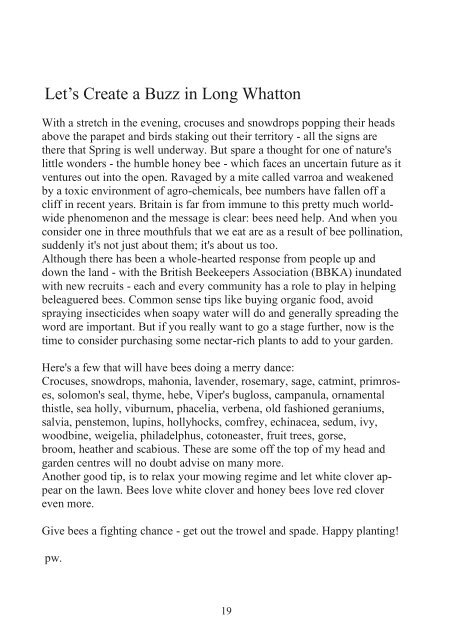Long Whatton News APRIL 2012 - Leicestershire Villages
Long Whatton News APRIL 2012 - Leicestershire Villages
Long Whatton News APRIL 2012 - Leicestershire Villages
Create successful ePaper yourself
Turn your PDF publications into a flip-book with our unique Google optimized e-Paper software.
Let’s Create a Buzz in <strong>Long</strong> <strong>Whatton</strong><br />
With a stretch in the evening, crocuses and snowdrops popping their heads<br />
above the parapet and birds staking out their territory - all the signs are<br />
there that Spring is well underway. But spare a thought for one of nature's<br />
little wonders - the humble honey bee - which faces an uncertain future as it<br />
ventures out into the open. Ravaged by a mite called varroa and weakened<br />
by a toxic environment of agro-chemicals, bee numbers have fallen off a<br />
cliff in recent years. Britain is far from immune to this pretty much worldwide<br />
phenomenon and the message is clear: bees need help. And when you<br />
consider one in three mouthfuls that we eat are as a result of bee pollination,<br />
suddenly it's not just about them; it's about us too.<br />
Although there has been a whole-hearted response from people up and<br />
down the land - with the British Beekeepers Association (BBKA) inundated<br />
with new recruits - each and every community has a role to play in helping<br />
beleaguered bees. Common sense tips like buying organic food, avoid<br />
spraying insecticides when soapy water will do and generally spreading the<br />
word are important. But if you really want to go a stage further, now is the<br />
time to consider purchasing some nectar-rich plants to add to your garden.<br />
Here's a few that will have bees doing a merry dance:<br />
Crocuses, snowdrops, mahonia, lavender, rosemary, sage, catmint, primroses,<br />
solomon's seal, thyme, hebe, Viper's bugloss, campanula, ornamental<br />
thistle, sea holly, viburnum, phacelia, verbena, old fashioned geraniums,<br />
salvia, penstemon, lupins, hollyhocks, comfrey, echinacea, sedum, ivy,<br />
woodbine, weigelia, philadelphus, cotoneaster, fruit trees, gorse,<br />
broom, heather and scabious. These are some off the top of my head and<br />
garden centres will no doubt advise on many more.<br />
Another good tip, is to relax your mowing regime and let white clover appear<br />
on the lawn. Bees love white clover and honey bees love red clover<br />
even more.<br />
Give bees a fighting chance - get out the trowel and spade. Happy planting!<br />
pw.<br />
19




